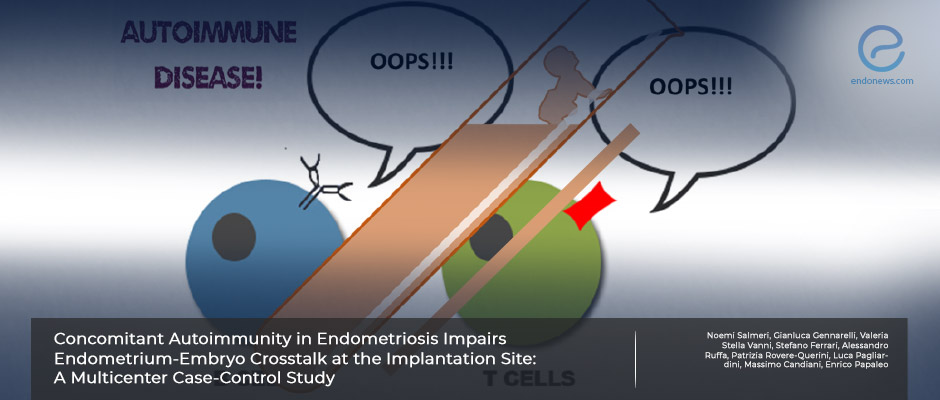Autoimmune Disorders in Women with Endometriosis May Impair Embryo Implantation
Jul 18, 2023
Autoimmune Disorders Lead to Lower Pregnancy Rates in endometriosis patients
Key Points
Highlights:
- Women with endometriosis and autoimmune disorders have a lower pregnancy rate compared to those without autoimmune disorders.
Importance:
- The study highlights the importance of considering concomitant autoimmune disorders in the management and treatment of endometriosis, particularly in the context of infertility.
What's done here:
- A retrospective multicenter case-control study involving 600 women with endometriosis, with 150 having concomitant autoimmune disorders; and 450 only with endometriosis diagnosis have been included.
- Participants received ART treatments, and the primary outcome was the cumulative clinical pregnancy rate, characterized as pregnancy resulting from both fresh and thawed cycles derived from a single egg collection procedure.
Key Results:
- The pregnancy rate was significantly lower in women with endometriosis and autoimmune disorders compared to those without autoimmune disorders.
- Compared with women with only endometriosis, women with autoimmune diseases had lower cleavage rates, implantation, and clinical pregnancy rates.
- Autoimmunity in endometriosis reduced the odds of cumulative clinical pregnancy rate by almost 50% after adjusting for significant confounders in the multivariate model.
Limitations:
- The study has a retrospective nature which impacts the randomization of cases.
- The study did not investigate the specific autoimmune disorders present in the participants and considered all the same.
Lay Summary
The retrospective study by Noemi Salmeri reports the effect of concomitant autoimmune disorders on the ability of the endometrium to support embryo implantation in women with endometriosis who underwent assisted reproductive technology (ART) treatments.
The study involved 600 women with endometriosis, with 150 having concomitant autoimmune disorders and 450 without. The participants received ART treatments, which included ovarian stimulation, oocyte retrieval, fertilization, and embryo transfer.
The primary outcome of the study was the cumulative clinical pregnancy rate, characterized as pregnancy resulting from both fresh and thawed cycles derived from a single egg collection procedure. The results showed that the pregnancy rate was significantly lower in the group with autoimmune disorders compared to the control group.
The authors suggest that this may be due to impaired communication between the endometrium and embryo at the implantation site, which is critical for a successful pregnancy. Compared with women with only endometriosis, women with autoimmune diseases had lower cleavage rates, implantation, and clinical pregnancy rates.
Autoimmunity in endometriosis reduced the odds of cumulative clinical pregnancy rate by almost 50% after adjusting for significant confounders in the multivariate model.
The study highlights the importance of considering concomitant autoimmune disorders in the management and treatment of endometriosis, particularly in the context of infertility. The authors of the study which was recently published in the Journal of Clinical Medicine suggest that further studies are needed to explore the underlying mechanisms of the impaired endometrial-embryo crosstalk in women with endometriosis and autoimmune disorders and to develop targeted interventions to improve pregnancy outcomes in these women.
Research Source: https://pubmed.ncbi.nlm.nih.gov/37240662/
endometriosis ivf autoimmune diseases

